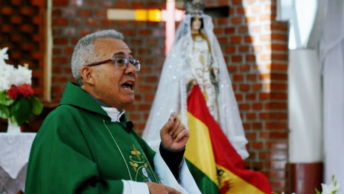Under the reign of Queen Elizabeth I—known to history as “Elizabeth the Great”—Catholics in England were in grave danger. Even though young Elizabeth had solemnly promised her dying older sister, Queen Mary I, that upon becoming queen, she would protect the rights of the Catholic Church, Elizabeth did just the opposite. It served her political purposes to support the Protestant, or Anglican, religion in England, so she allowed a fierce persecution of Catholics to occur. Many of them fled into exile or had all their possessions confiscated by the government, and many others were imprisoned, tortured, and even martyred. Quite a few Catholics, however, chose the path of least resistance and, fearing men instead of God, renounced their Catholic faith and became Anglican. Such was the case with the parents of a young man named Edmund Campion. The boy was raised as an Anglican, and at Oxford University was such an outstanding student, scholar, and orator that when the queen visited there, he was chosen to make the opening address. Gaining Elizabeth’s patronage, Edmund’s future was very promising, but when preparing to be ordained an Anglican deacon, he happened to read many of the writings of the early Church Fathers—and these convinced him that being true to God required him to become a Catholic. Forced to flee for his life, Edmund went to the European continent, where he studied with the Jesuits and was ordained a priest. He was one of the first Jesuits sent back to England to minister in secret to the Catholics there; the night before he left, one of the other priests at the college—perhaps inspired by the Holy Spirit—wrote over the door to his room, “Father Edmund Campion, Martyr.”
Because of his public reputation and earlier favor with the queen, returning to England was particularly dangerous for Edmund, but he responded to this challenge not with fear, but with a sense of adventure. For about a year-and-a-half he managed to stay ahead of the authorities, visiting Catholics in disguise, celebrating the sacraments in secret, and eluding spies and government informers; he even issued a public challenge in print to the leaders of the Anglican church, offering to debate with them on the identity of the True Faith. Finally Edmund was betrayed, arrested, and imprisoned, along with several companions; when he couldn’t be bribed into abandoning his faith, he was tortured—but remained firm. He was visited by his sister, who offered him the promise of a royal pardon and an important position if only he’d renounce Catholicism, but he refused. He was visited by the man who betrayed him, whose guilty conscience prompted him to beg his forgiveness; Edmund not only forgave him, but wrote him a letter of recommendation so that the man might find safety with an important Catholic noble in Germany. During the trial which followed, Edmund fearlessly and brilliantly conducted his own defense—but the outcome was predetermined, and a guilty verdict was rendered. In 1581 Father Edmund Campion and two other Jesuits were executed by hanging; on the scaffold he publicly prayed for Queen Elizabeth and the English people, and a young man who witnessed this—Henry Walpole—was so moved that he became a Catholic and later a Jesuit, and was himself eventually martyred. St. Edmund Campion is a wonderful illustration of what Jesus tells us in the Gospel: do not fear those who can kill the body but not the soul; rather, fear God alone. We must live in this world with our gaze on the world to come. If we do give our allegiance to Christ, He will give us the wisdom, courage, and strength we need to stand firm.
We’re reminded today that it’s not always easy to serve God, but it is always worth the effort. St. Paul speaks of how through one man—Adam—sin entered the world; because of the powerful presence of sin, those who try to live in accord with God’s will are going to stand out and perhaps even attract persecution. This was certainly the case with the prophet Jeremiah; by calling upon sinners to repent, and warning them of impending disaster if they refused, he made many dangerous enemies—but the Lord was with him, like a mighty champion. Jesus develops this idea in the Gospel. Since God is all-powerful and all-knowing, nothing can be kept secret from Him, and no one is beyond His authority and power. The harm other people may do to us is temporary; God’s judgment—and His blessings upon His faithful servants—is everlasting. Therefore, Jesus urges us to follow Him, to proclaim His truth, and to acknowledge Him by our way of life—for our very salvation depends upon it.
About forty-five years before St. Edmund Campion was executed for his faith, another great English Catholic was facing martyrdom: St. Thomas More. He had been the friend and royal chancellor, or prime minister, of King Henry VIII (the father of Queen Elizabeth), but when Henry required his officials to swear allegiance to him as head of the Church in England—something no Catholic could do in good conscience—Sir Thomas More refused, and was arrested. While in the Tower of London, awaiting the trial that would lead to his eventual martyrdom, Thomas More wrote to his daughter: “I will not mistrust [Jesus], Meg, though I shall feel myself weakening and on the verge of being overcome with fear. I shall remember how Saint Peter at a blast of wind began to sink because of his lack of faith, and I shall do as he did: call upon Christ and pray to Him for help. And then I shall trust He shall place His holy hand on me and in the stormy seas hold me up from drowning.”
This is what each of us must do when our fears and worries threaten to overwhelm us: call out to Christ in prayer. If we rely upon our own strength, we will certainly fail; if we rely upon the grace and strength of Jesus, however, we will not be disappointed. Whenever we find ourselves facing any difficulty—no matter how large or small—our first impulse should be to call out to God, whether by praying aloud or silently. Whenever we experience opposition or ridicule because of our faith, we should remind ourselves that all things will eventually be made known in the light of God’s truth, and that His judgments will prevail—not those of this world. Whenever we find ourselves struggling over a moral decision, or afraid to do what we know to be right, we need to recall Our Lord’s words in the Gospel: “Everyone who acknowledges Me before others I will acknowledge before My heavenly Father. But whoever denies Me before others, I will deny before My heavenly Father.” Fear of other people is useless, and often leads to sin, misery, and unnecessary suffering—whereas a healthy fear of God’s judgment can actually lead to peace, joy, and a deeper experience of love. Christ’s words are a terrible warning to those who ignore them, but a life-giving promise to those who heed them. Let us set aside our fears and place our lives in God’s hands—for in this way the Lord’s blessings will truly and eternally be upon us.








